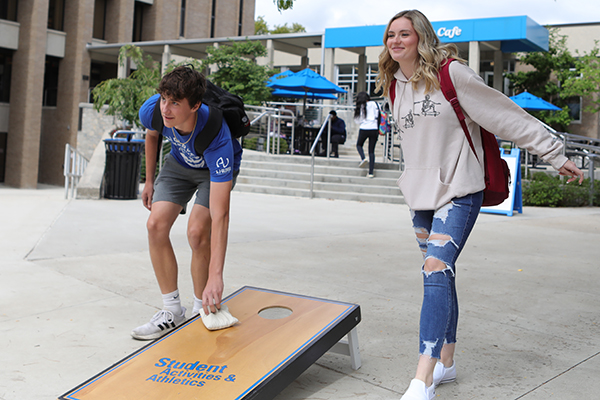Weeks of Welcome
We’re so glad you’ve chosen Columbus State for the 2023-2024 school year! The first few weeks of class are an exciting time on campus, filled with opportunities to make long lasting memories.
The Columbus State Welcome Team, consisting of volunteer faculty and staff, is here to help you navigate the campus and get connected to helpful resources. We also offer a wide range of fun activities across the college so you can enjoy the spirit of Columbus State alongside your friends and peers. During the third week of classes, Student Success Week will kick off, featuring events to introduce you to resources on campus and give you helpful tips to succeeding in college. Let’s make some memories!
Jump to:
Weeks of Welcome Events
Spring 2024
Student success Week
January 28 - February 1
Columbus Campus
This semester's theme is "Create, Connect, & Care." Check out pop-up tables around campus that will be offering helpful information, tips, and more!
Resource Fair
January 30
11:00 a.m. - 1:00 p.m.
Nestor Hall Lounges
Make sure you stop by the Spring Resource Fair in Nestor Hall to connect with college resources and student clubs.
VIrtual Game Night with Student amBassadors
February 1
6:00 p.m. - 8:00 p.m.
Online
Meet some of your Student Ambassadors and join us for a fun night of online games! Register here.
Student Strategies to Start Strong
The first few weeks of classes are critical for students to build a foundation for success for the semester and beyond. There are specific steps you can take right now:

Build Relationships and Connect
- Learn the names of your instructors and professors.
- Read the syllabus for each class.
- Sign up for Cougar Connect for events and to connect with other students.

Engage and Stay Encouraged
- Show up to class, whether it is online or on campus.
- Before class, write down questions from the materials so you are ready to participate.
- Ask for clarification when you don’t understand a topic.
- Visit faculty members during office hours if you need additional assistance.

Communicate, Celebrate, and Aspire
- Stay motivated to accomplish things.
- Remind yourself why you are in college and why it’s important to you and your family.
- Do a countdown to graduation by marking down the days each semester.

Support and Collaborate
- Everyone can use a hand sometimes; Asking for help is healthy.
- Use free resources: Career Services, Counseling Services, and Accessibility & Testing.
- Don’t wait until there is a problem. Seek out Tutoring Services which are free of charge.
- Library services are available remotely, and there is a live chat option.
- IT Support services are free at www.cscc.edu/helpdesk and 614-287-5050.





